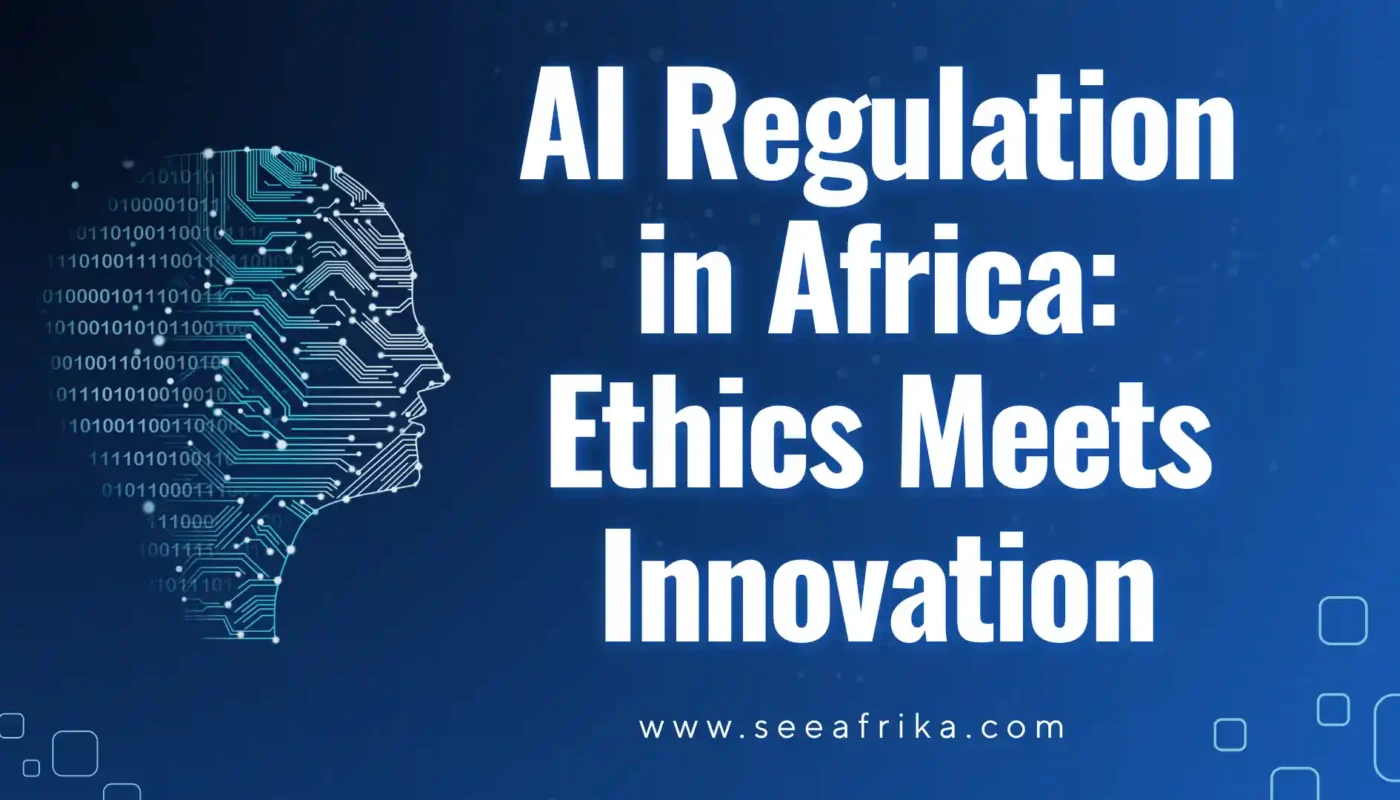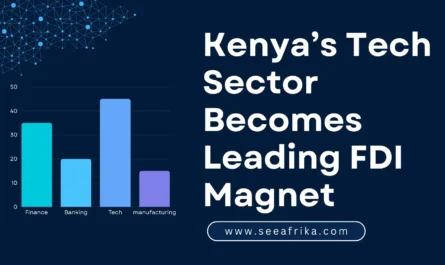In recent years, Africa has witnessed a surge in the adoption of Artificial Intelligence (AI) technologies across various sectors. However, this rapid growth has also highlighted significant ethical and regulatory challenges.
A notable example is the controversy surrounding the use of facial recognition technology in certain African countries, where concerns about the misuse of biometric data and privacy violations have sparked public outcry. Such incidents underscore the urgent need for robust AI regulation in Africa to ensure that technological advancements do not come at the expense of citizens’ rights and societal values.

As AI continues to permeate healthcare, fintech, agriculture, and governance, the continent stands at a crucial crossroads. The development and implementation of tailored AI regulatory frameworks and ethical guidelines are crucial for harnessing the benefits of AI while mitigating its risks.
This article explores the current state of AI regulation and ethics in Africa, highlighting challenges, progress, and the path forward.
Also read: Africa in the AI Age: Can the Continent Leapfrog into the Future?
Why AI Regulation Matters in Africa
AI adoption in Africa is accelerating rapidly, transforming industries such as healthcare, financial technology, and agriculture. For instance, AI-powered diagnostic tools are improving healthcare delivery, while fintech innovations are expanding financial inclusion. Yet, alongside these opportunities lie significant risks of misuse, including algorithmic bias, invasive surveillance, and exploitation of personal data.
Africa’s unique socio-political landscape amplifies these risks. Digital inequality persists, characterized by uneven access to technology and internet connectivity. Political instability in certain regions raises concerns about the potential for authoritarian misuse of AI for surveillance and control. Additionally, Africa’s diverse legal systems complicate the creation of unified regulatory approaches.
According to experts and recent reports, ignoring AI ethics could exacerbate existing inequalities and undermine trust in technology. As one African AI leader noted, “Without ethical AI governance, the continent risks perpetuating systemic biases and digital colonialism.”
Why Africa Can’t Ignore AI Ethics
As Artificial Intelligence (AI) technologies rapidly integrate into African societies, the imperative for AI regulation in Africa, grounded in ethical principles, becomes undeniable. Ignoring AI ethics risks not only technological harm but also the erosion of cultural identity, social cohesion, and sovereignty.
Here is why Africa must prioritize ethical AI frameworks tailored to its unique context.
1. Rapid AI Integration Demands Proactive Regulation to Prevent Harm
The adoption of AI across various sectors, including healthcare, finance, agriculture, and security, is accelerating in Africa. However, without timely and proactive AI regulation in Africa, these technologies can cause unintended harm. For example, biased algorithms may reinforce existing social inequalities, while unregulated surveillance tools could infringe on privacy and civil liberties.
The fast pace of AI innovation often outstrips the development of legal frameworks, creating regulatory gaps that expose citizens to risks. Proactive regulation is essential to anticipate and mitigate harms before they become systemic, ensuring AI benefits all Africans equitably.
2. Ethical AI Frameworks Must Reflect African Cultural Values and Societal Needs
A fundamental reason Africa cannot ignore AI ethics is that ethical frameworks must resonate with local cultural values and societal realities. African philosophies, such as Ubuntu, which emphasize interconnectedness, community, and shared humanity, offer a robust foundation for ethical AI governance.
Integrating such indigenous values into AI regulation in Africa fosters systems that prioritize social harmony, restorative justice, and collective well-being rather than individualism or purely technical efficiency.
This cultural grounding helps ensure AI technologies are not only practical but also socially acceptable and trusted by African communities.
Embedding African epistemologies into AI ethics also means addressing language diversity, traditional knowledge, and local social norms. Many AI systems developed in Western contexts often fail to capture these nuances, resulting in biased or irrelevant outcomes.
By tailoring AI ethics to African contexts, the continent can avoid the imposition of foreign values and protect its rich cultural heritage.
Also read: AI Tools Transforming Classrooms in Africa: A New Era in Education
3. Regulation Ensures Data Sovereignty and Protects Against Foreign Exploitation
Data sovereignty — the principle that data generated within a country should be subject to its laws and governance — is a critical ethical concern for Africa. Many AI applications in Africa rely on data collected and controlled by foreign companies, raising fears of digital colonialism and exploitation.
Without robust AI regulation in Africa, the continent risks losing control over its citizens’ data, which can be used for profit or political leverage by external actors.
Ethical AI regulation must include clear rules on data ownership, privacy, consent, and cross-border data flows to protect the interests of Africa. This safeguards citizens’ rights and promotes local innovation by ensuring African entities can access and benefit from their data.
Strengthening data sovereignty through regulation is thus essential to prevent exploitation and foster equitable AI ecosystems.

4. Inclusive AI Governance Fosters Innovation Aligned with Local Priorities
Ultimately, effective ethical AI governance in Africa must be inclusive, involving all stakeholders, including governments, academia, the private sector, civil society, and local communities, in the decision-making process.
Inclusive governance ensures that AI policies reflect diverse perspectives and address real local needs rather than imported agendas. This approach encourages innovation that is socially responsible and aligned with African development goals.
By incorporating ethical principles such as fairness, transparency, accountability, and respect for human rights into AI regulation in Africa, stakeholders can foster trust and legitimacy in AI technologies. This trust is crucial for widespread adoption and for leveraging AI to solve pressing challenges like healthcare access, food security, and education.
Moreover, inclusive governance helps build capacity and awareness around AI ethics, empowering Africans to shape their digital futures rather than being passive consumers of external technologies.
Also read: Tech Adoption in Kenya: A Transformative Journey
The Current Regulatory Landscape in Africa
The development of AI regulation in Africa reflects a continent at a pivotal stage of technological adoption, where nations are actively crafting frameworks to harness the potential of AI while addressing its associated risks.
Though still nascent compared to global counterparts, several countries have launched pioneering initiatives, each tailored to local priorities yet interconnected in advancing ethical AI governance across the region.
Below is a detailed analysis of key national efforts shaping Africa’s AI regulatory future.
South Africa: Drafting a Foundation for Ethical AI
South Africa leads in formalizing AI regulation in Africa through its National AI Policy Framework. Spearheaded by the Department of Communications and Digital Technologies (DCDT), this draft policy aims to position the country as an AI innovation hub while embedding ethical safeguards.
Key elements include:
- Twelve Strategic Pillars: Covering talent development, ethical guidelines, data protection, and human-centered design. For example, the policy mandates “fairness and mitigating bias” through diverse data training and “transparency and explainability” in AI decision-making.
- Legislative Pathway: The framework, currently under evaluation (as of April 2025), will inform future AI-specific regulations or an AI Act. It emphasizes socioeconomic equity, aiming to leverage AI for inclusive growth and public service efficiency.
- Public Consultation: Stakeholders from academia, industry, and civil society contributed to the draft, reflecting South Africa’s commitment to participatory governance.
However, delays in finalizing the policy have drawn criticism, with experts urging acceleration to avoid falling behind regional peers.
Kenya: Data Protection as a Cornerstone
Kenya’s approach to AI regulation in Africa centers on its Data Protection Act (2019), enforced by the Office of the Data Protection Commissioner. While not AI-exclusive, this law establishes critical foundations:
- Data Governance: Requires the lawful processing of personal data, which directly impacts AI systems that rely on user information.
- Accountability Mechanisms: Mandates impact assessments for high-risk data processing, setting a precedent for ethical AI audits.
- Emerging AI Guidelines: Discussions are underway to expand these rules into sector-specific AI regulations, particularly for fintech and healthtech innovations.
Kenya’s model demonstrates how robust data laws can scaffold early-stage AI governance in resource-constrained environments.

Egypt: National Strategy for Innovation
Egypt’s National AI Strategy prioritizes technological advancement alongside ethical guardrails. Launched in 2024, it focuses on:
- Sectoral Transformation: Targeting healthcare, agriculture, and smart cities, with AI ethics integrated into deployment protocols.
- R&D Investment: Establishing dedicated AI research centers and public-private partnerships to drive homegrown solutions.
- Regional Leadership: Positioning Egypt as a North African AI hub, though detailed implementation frameworks remain in development.
This strategy highlights how AI regulation in Africa can strike a balance between growth ambitions and societal well-being.
Nigeria: Grassroots Pressure Meets Policy Development
Nigeria’s AI regulation in Africa journey is characterized by bottom-up advocacy and emerging top-down frameworks:
- Draft AI Policy: The National Information Technology Development Agency (NITDA) is developing guidelines that address bias, accountability, and transparency in AI systems.
- Innovation Ecosystem: Tech hubs in Lagos and Abuja are self-regulating through ethical charters, influencing national policy discussions.
- Urgent Needs: As AI continues to accelerate in finance and logistics, stakeholders are demanding clarity on data rights and algorithmic accountability to prevent the misuse of these technologies.
Nigeria exemplifies the tension between rapid innovation and deliberate regulatory maturation.
At the regional level, the African Union’s Digital Transformation Strategy (2020–2030) aims to harmonize AI governance and promote the development of ethical AI across member states.
It advocates for:
- Harmonized Standards: Shared frameworks for data protection and AI ethics to enable cross-border collaboration.
- Infrastructure Investment: Expanding digital connectivity to support AI ecosystems.
- Inclusive Governance: Ensuring marginalized communities influence AI policy design.
This vision, while aspirational, recognizes that fragmented national approaches could undermine Africa’s collective AI potential.
Key Challenges to Effective AI Regulation in Africa
Several factors hinder the development and enforcement of effective AI regulation in Africa:
- Policy Lag: AI technologies evolve faster than legal systems can keep pace, resulting in regulatory gaps.
- Limited Technical Expertise: Policymakers often lack the specialized knowledge needed to craft nuanced AI laws.
- Weak Enforcement: Existing data protection laws are poorly enforced due to underfunded regulatory bodies.
- Fragmented Governance: Inconsistent policies across countries impede regional collaboration.
- Global Representation: Africa has a limited voice in international AI governance forums, affecting its ability to influence global standards.
For example, in Lagos, Nigeria, developers are innovating rapidly in AI applications; however, outdated policies and regulatory uncertainty hinder broader adoption and investment.
Also read: African Schools Embrace the AI Revolution
Ethical Concerns Unique to the African Context
As AI technologies increasingly permeate African societies, the continent faces a distinct set of ethical challenges that differ from those encountered elsewhere. These challenges underscore the critical need for robust AI regulation in Africa that is sensitive to local realities and capable of safeguarding the rights, cultures, and sovereignty of African peoples.
Below, we explore four key ethical concerns unique to the African context.
Algorithmic Bias: The Impact of Western-Centric Data
A pervasive issue in AI development is algorithmic bias, which arises when AI systems are trained on datasets that do not accurately represent the diversity of their users. In Africa, many AI models rely heavily on Western-centric datasets that overlook the continent’s vast linguistic, cultural, and demographic diversity.
This leads to AI systems that produce biased or inaccurate outcomes when applied in a local context. For example, facial recognition technologies often perform poorly on African faces due to underrepresentation in training data, resulting in misidentification and discrimination.
Without targeted AI regulation in Africa, such biases can exacerbate existing social inequalities and marginalize vulnerable groups. Ethical AI frameworks must mandate the use of representative datasets and continuous bias audits to ensure fairness and inclusivity in AI applications across African contexts.
Data Sovereignty: Guarding African Digital Assets
Data sovereignty refers to the principle that data generated within a country should be subject to its laws and governance, ensuring that data is protected and controlled within its borders. In Africa, this principle is under threat as foreign technology firms frequently collect, store, and control vast amounts of data from the continent.
This dynamic raises serious concerns about digital colonialism—the extraction and exploitation of data as a resource without adequate benefit or control for the data originators.
Effective AI regulation in Africa must establish clear rules regarding data ownership, consent, and cross-border data transfers to protect the privacy and economic interests of African citizens. Strengthening data sovereignty empowers local governments and communities to govern their digital assets, fostering trust and enabling homegrown AI innovation.
Surveillance Risks: Balancing Security and Human Rights
AI-powered surveillance technologies, including facial recognition and predictive policing, are increasingly deployed across Africa. While these tools can enhance security and public safety, they also carry significant risks when used without proper oversight. Authoritarian regimes may exploit AI surveillance to monitor political opponents, suppress dissent, and curtail freedoms, often circumventing legal checks and balances.
The absence of stringent AI regulation in Africa leaves citizens vulnerable to privacy violations and state overreach. Ethical AI governance must include transparent accountability mechanisms, judicial oversight, and safeguards to prevent misuse of surveillance technologies, thereby protecting fundamental human rights.
Digital Colonialism: From Consumers to Creators
A broader ethical concern is Africa’s position in the global AI ecosystem. Currently, much of the AI infrastructure, research, and intellectual property is developed outside the continent, relegating African countries to the role of consumers rather than creators. This digital colonialism limits local ownership, stifles innovation, and perpetuates dependency on foreign technologies that may not align with African priorities or values.
To counter this, AI regulation in Africa should promote capacity building, support local AI research and development, and incentivize the creation of African AI solutions. By fostering an environment where Africans lead AI innovation, the continent can assert digital sovereignty and ensure technologies serve its unique developmental goals.
Is Africa Being Left Out of the Global AI Ethics Conversation?
The global AI ethics conversation has historically been dominated by Western and East Asian perspectives, often leaving African voices on the sidelines. This exclusion means that many international AI ethical frameworks do not fully capture or address the unique social, cultural, and economic realities of the African continent.
As a result, AI regulation in Africa risks being shaped by standards that may not align with local values or effectively tackle region-specific challenges such as digital inequality, data sovereignty, and algorithmic bias. Without active participation in global AI governance, Africa risks adopting frameworks that could inadvertently perpetuate technological dependence and marginalization.
To address this gap, it is crucial for African stakeholders—including governments, academia, civil society, and the private sector—to actively engage in international AI ethics dialogues while simultaneously crafting homegrown regulatory frameworks. This dual approach will empower Africa to shape global AI norms and develop locally relevant policies that protect citizens and foster innovation.
Ultimately, amplifying African perspectives in the global AI ethics conversation and embedding indigenous values into regulation will enable the continent to lead the way in ethical, culturally sensitive AI development.
Positive Movements and Opportunities in AI Regulation in Africa
Despite the significant challenges facing AI regulation in Africa, a range of promising initiatives are emerging that advance ethical AI development and governance across the continent.
These efforts, spanning grassroots organizations, academic institutions, private tech hubs, and regional collaborations, demonstrate Africa’s growing capacity to shape AI innovation responsibly and inclusively.
Grassroots and Academic Contributions Driving Ethical AI
Several key organizations are at the forefront of promoting research, capacity building, and locally relevant AI solutions. Data Science Africa plays a pivotal role by fostering AI research communities and training programs that build technical expertise tailored to African contexts.
Similarly, the Lacuna Fund provides crucial support to AI projects that address pressing local challenges, ensuring that AI applications are grounded in real-world needs. The AI4D Africa Initiative further advances this agenda by aligning AI innovation with the Sustainable Development Goals, encouraging projects that contribute to social and economic progress.
These academic and grassroots contributions are vital in informing AI regulation in Africa, ensuring that policies reflect on-the-ground realities and promote ethical standards.
Calls for an African AI Ethics Charter
Recognizing the need for continent-wide ethical guidance, there are ongoing efforts to develop an African AI Ethics Charter. This proposed framework aims to codify ethical principles rooted in African cultural values such as solidarity, dignity, and communal responsibility.
By establishing a shared set of guidelines, the Charter would provide a foundation for harmonized AI regulation in Africa, helping countries adopt consistent standards that protect citizens’ rights while fostering innovation.
Such a unified ethical framework would also enhance Africa’s influence in global AI governance discussions.
The Role of Private Tech Hubs in Responsible Innovation
Private sector innovation hubs across Africa play a crucial role as catalysts for responsible AI development. These hubs serve as collaborative spaces where developers, regulators, academics, and civil society converge to co-create AI solutions that prioritize ethical considerations.
By encouraging inclusive policymaking and facilitating dialogue among diverse stakeholders, tech hubs help bridge the gaps between innovation and regulation. Their role is instrumental in translating ethical principles into practical applications, thereby advancing effective AI regulation in Africa that supports both technological growth and societal well-being.
Together, these positive developments underscore Africa’s potential to lead in the development of ethical AI design. Through inclusive governance, capacity building, and culturally grounded frameworks, the continent is laying the groundwork for a future where AI technologies are developed, deployed, and utilized responsibly, equitably, and sustainably.
Also read: Nigeria’s Tech Revolution: Leading the Way in African Startups
Conclusion: Building a Responsible AI Future
Africa stands at a pivotal moment in shaping its AI trajectory. Without proactive and culturally informed AI regulation, the risks of bias, surveillance, and digital exploitation could overshadow the transformative benefits AI promises.
However, with coordinated efforts, investment in capacity building, and inclusive governance, Africa can not only safeguard its citizens but also emerge as a global leader in ethical AI innovation.
If you enjoy our content, you’ll love the amazing stories we share on Facebook, Telegram, and Twitter!
Subscribe and follow us for more premium SeeAfrika content.




